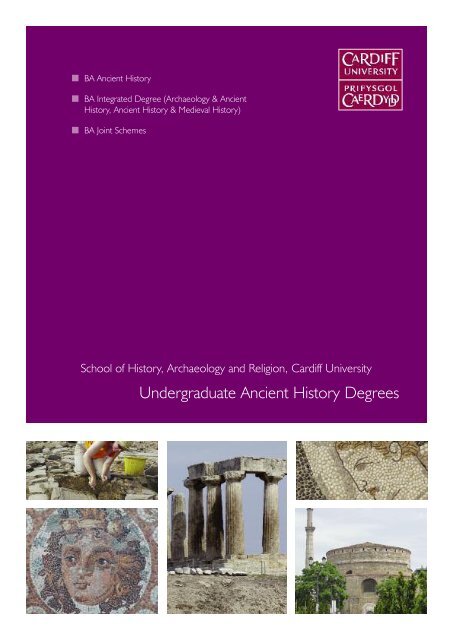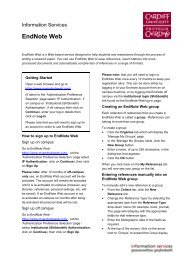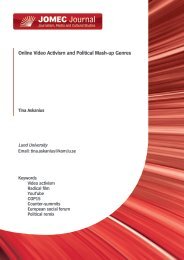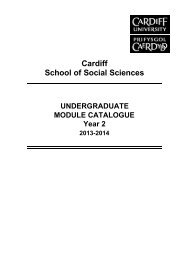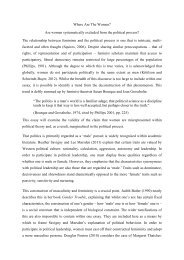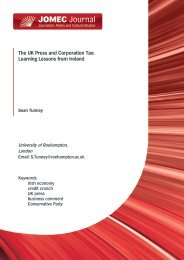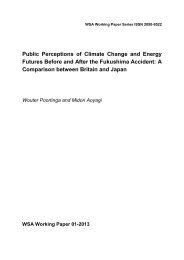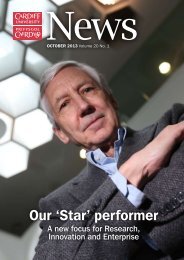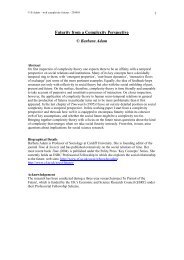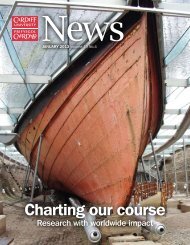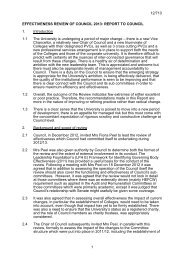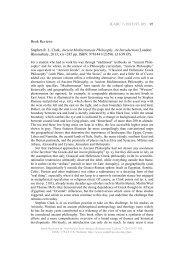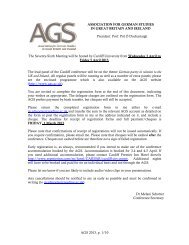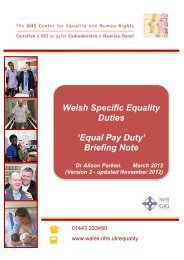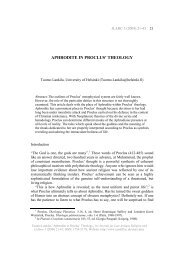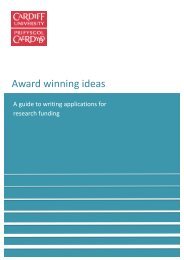Undergraduate Ancient History Degrees - Cardiff University
Undergraduate Ancient History Degrees - Cardiff University
Undergraduate Ancient History Degrees - Cardiff University
Create successful ePaper yourself
Turn your PDF publications into a flip-book with our unique Google optimized e-Paper software.
BA <strong>Ancient</strong> <strong>History</strong><br />
BA Integrated Degree (Archaeology & <strong>Ancient</strong><br />
<strong>History</strong>, <strong>Ancient</strong> <strong>History</strong> & Medieval <strong>History</strong>)<br />
BA Joint Schemes<br />
School of <strong>History</strong>, Archaeology and Religion, <strong>Cardiff</strong> <strong>University</strong><br />
<strong>Undergraduate</strong> <strong>Ancient</strong> <strong>History</strong> <strong>Degrees</strong>
<strong>Cardiff</strong> <strong>University</strong> is one of the UK’s<br />
major teaching and research<br />
universities and a member of the<br />
elite ‘Russell Group’.<br />
Located in the centre of the capital<br />
city of Wales, it has an international<br />
reputation for teaching and research,<br />
and attracts staff and students from<br />
around the world.<br />
<strong>Cardiff</strong> <strong>University</strong> and <strong>Cardiff</strong> School of <strong>History</strong>,<br />
Archaeology and Religion<br />
<strong>Cardiff</strong> School of <strong>History</strong>, Archaeology and<br />
Religion is home to four Departments:<br />
<strong>Ancient</strong> <strong>History</strong>, Archaeology &<br />
Conservation, <strong>History</strong> & Welsh <strong>History</strong> and<br />
Religious Studies & Theology. The School<br />
brings together 60 academic staff and<br />
around 800 undergraduates and 200<br />
postgraduates in the Humanities Building,<br />
next to the Arts and Social Studies Library,<br />
and just a short walk from the heart of<br />
the capital.<br />
The <strong>Ancient</strong> <strong>History</strong> Department has an<br />
international reputation for its teaching and<br />
research. Its graduates regularly enter<br />
careers in the financial services, law, the<br />
Civil Service, journalism, teaching, the<br />
police, the armed forces and a wide range<br />
of other professions. The transferable skills<br />
provided by an <strong>Ancient</strong> <strong>History</strong> degree are<br />
increasingly sought after by employers and<br />
offer our graduates a wide choice of career<br />
opportunities. A good number of our<br />
students advance to postgraduate study in<br />
both <strong>Ancient</strong> <strong>History</strong> and a variety of other<br />
specialist and vocational subjects.<br />
The School offers students its own<br />
computer lab with 24 pcs and a<br />
photographic lab within the Humanities<br />
Building. Wi-fi is available across the<br />
<strong>University</strong>. Within the School, the<br />
Department benefits from its own<br />
collection of books and journals in the<br />
Sheila White Library and from expertise in<br />
the <strong>Cardiff</strong> Centre for Late Antique<br />
Religion and Culture. The department has<br />
strong links with other <strong>Ancient</strong> <strong>History</strong> and<br />
Classics departments in the UK, and hosted<br />
the national 2010 Classical Association<br />
Conference.<br />
Staff in <strong>Ancient</strong> <strong>History</strong> study the history,<br />
epigraphy and archaeology of Greece,<br />
Rome and their neighbours from the early<br />
Iron Age to the Byzantine Empire. Our<br />
teaching is augmented by lecturers with<br />
relevant specialities in Archaeology and<br />
Medieval <strong>History</strong>.<br />
SCHOOL OF HISTORY, ARCHAEOLOGY AND RELIGION, ANCIENT HISTORY DEPARTMENT, CARDIFF UNIVERSITY • 2<br />
What the papers say about us<br />
‘<strong>Cardiff</strong> is long established as the front-runner<br />
in Welsh higher education and a leading<br />
player in the UK and beyond. It is a member<br />
of the Russell Group of 20 research-led<br />
universities and has two Nobel Laureates on<br />
its staff. Teaching quality is also highly rated<br />
…the Quality Assurance Agency complimented<br />
the university on its ‘powerful academic<br />
vision and well-developed and effectively<br />
articulated mission to achieve excellence in<br />
teaching and research’. <strong>Cardiff</strong> has done<br />
well in every edition of the National Student<br />
Survey, finishing just outside the top 30<br />
in 2009.’<br />
Times Good <strong>University</strong> Guide, June 2011<br />
‘<strong>Cardiff</strong> seems to have it all: grand civic<br />
architecture in a breezy waterside location,<br />
super-smart city bars and venues just a<br />
short hop from lovely countryside. The<br />
university is as confident and forwardlooking<br />
as the city it’s located in, and has<br />
an excellent reputation for the quality of its<br />
teaching and research. Almost 60% of its<br />
research is ranked as world-leading and it is<br />
a member of the Russell group of leading<br />
research universities. There are<br />
approximately 27,000 students, including<br />
more than 3,000 from over 100 countries<br />
outside the UK, helping to create a vibrant,<br />
cosmopolitan community.’<br />
The Guardian 8 June 2010<br />
Contacts<br />
Information on <strong>Cardiff</strong> and the university<br />
for prospective students can be found at<br />
www.cardiff.ac.uk/for/prospective/<br />
index.html<br />
For more information on our degrees<br />
contact the appropriate Admissions Tutor.<br />
Email:<br />
ancienthistoryugadmissions@cardiff.ac.uk<br />
Tel: +44 (0)29 2087 4821
BA <strong>Ancient</strong> <strong>History</strong><br />
<strong>Ancient</strong> <strong>History</strong> at <strong>Cardiff</strong> offers a<br />
balance between historical period<br />
courses – focusing on political,<br />
institutional and military change – and<br />
thematic aspects: religion, economic,<br />
social and cultural history, by constructing<br />
historical arguments based on primary<br />
sources. You will learn directly from<br />
ancient historians working in the subject<br />
about the Greco-Roman world from the<br />
Late Bronze Age to the fall of the<br />
Roman Empire and the emergence of<br />
the Byzantine empire.<br />
BA <strong>Ancient</strong> <strong>History</strong> & Medieval<br />
<strong>History</strong> (Integrated), V116<br />
This scheme provides students with the<br />
opportunity to study the development<br />
of the Mediterranean and European<br />
worlds from the Late Bronze Age to the<br />
medieval period, drawing on modules<br />
taught by historians actively researching<br />
a wide variety of aspects of this period,<br />
including relations between East and<br />
West, gender and sexuality, and warfare.<br />
Typical offers<br />
BA <strong>Ancient</strong> <strong>History</strong>: ABB<br />
Which Degree is for Me?<br />
BA Archaeology & <strong>Ancient</strong> <strong>History</strong><br />
(Integrated), VVC4<br />
This single honours scheme enables you<br />
to gain an understanding of the history<br />
and archaeology of the Classical World<br />
and draws on modules taught by both<br />
archaeologists and ancient historians.<br />
It places particular emphasis on<br />
studying aspects of the past from an<br />
inter-disciplinary perspective and<br />
includes 8 weeks of hands-on excavation<br />
experience. This is a vital and highly<br />
popular element of the degree scheme,<br />
and students have recently worked on<br />
excavations in Greece, Romania and<br />
Egypt as well as in the UK, most notably<br />
at the Roman legionary fortress in<br />
Caerleon.<br />
BA Joint Schemes<br />
Through the flexible modular nature of<br />
the <strong>Cardiff</strong> degree schemes you can<br />
study <strong>Ancient</strong> <strong>History</strong> in combination<br />
with a range of other subjects, both<br />
within the School of <strong>History</strong>,<br />
Archaeology and Religion and outside it.<br />
Popular combinations to continue your<br />
passion for two subjects include <strong>Ancient</strong><br />
<strong>History</strong> and English, <strong>Ancient</strong> <strong>History</strong> and<br />
Philosophy, and <strong>Ancient</strong> <strong>History</strong> with a<br />
modern language. Joint honours degree<br />
schemes require no greater workload<br />
than single honours. Many combinations<br />
are available and students interested in<br />
these should contact the Admissions<br />
Tutor for further information.<br />
SCHOOL OF HISTORY, ARCHAEOLOGY AND RELIGION, ANCIENT HISTORY DEPARTMENT, CARDIFF UNIVERSITY • 3
Most <strong>Ancient</strong> <strong>History</strong> modules are taught<br />
through a combination of lectures,<br />
seminars and tutorials. Seminars involve<br />
groups of 12-14 students discussing a<br />
range of topics related to the module<br />
under the guidance of a specialist tutor.<br />
Students attend around 8-12 hours of<br />
teaching a week, and this is supplemented<br />
by private study to make your total<br />
learning hours 35 or more each week.<br />
All <strong>Ancient</strong> <strong>History</strong> students study<br />
Introduction to <strong>Ancient</strong> Greek <strong>History</strong> and<br />
Introduction to Roman <strong>History</strong> in Year One,<br />
and like all Humanities students at <strong>Cardiff</strong>,<br />
choose additional first year modules on a<br />
wide range of subjects offered by other<br />
departments and schools in the<br />
<strong>University</strong>. This provides a wonderful<br />
opportunity to continue with a subject<br />
you enjoyed at school or to try something<br />
completely different that you’ve never<br />
had a chance to study before.<br />
In Year Two, all students take Literary<br />
Evidence for <strong>Ancient</strong> <strong>History</strong> and Material<br />
Evidence for <strong>Ancient</strong> <strong>History</strong> to provide<br />
them with specialist skills in using the<br />
different types of evidence available, as<br />
well as Independent Study. This module<br />
provides the preparation for your Special<br />
Subject Dissertation in the final year to<br />
develop advanced skills in research,<br />
project management and working<br />
independently.<br />
Our Second and Third Years study their<br />
option modules together, and over these<br />
two years, you choose from a large range<br />
of subjects covering key periods and<br />
themes relating to the ancient world, and<br />
including interdisciplinary modules taught<br />
by specialists in Archaeology and Medieval<br />
<strong>History</strong>. The majority of these modules<br />
are taught by leading scholars in their<br />
fields. See opposite for a typical range of<br />
modules on offer.<br />
Teaching and Learning<br />
Each student is assigned a Personal Tutor<br />
who provides pastoral care, and with<br />
whom students may discuss and reflect<br />
upon their overall academic progress.<br />
<strong>Ancient</strong> <strong>History</strong> staff have an ‘open door’<br />
policy for their personal tutees and are<br />
widely available for consultation.<br />
Teaching at <strong>Cardiff</strong> is research-led. This<br />
means that students are being taught by<br />
individuals whose research is shaping and<br />
re-defining the way we think about the<br />
past. <strong>Cardiff</strong> <strong>Ancient</strong> <strong>History</strong> students are<br />
therefore at the forefront of new<br />
research and are well placed to<br />
undertake postgraduate study in<br />
the future.<br />
Making the most of local<br />
and national heritage –<br />
Trips and Visits<br />
Home to the National Museums and<br />
Galleries of Wales, <strong>Cardiff</strong> is surrounded<br />
by important historical and archaeological<br />
landscapes and monuments, from Roman<br />
forts and towns to Medieval settlements<br />
and castles.<br />
<strong>Ancient</strong> <strong>History</strong> students have the<br />
opportunity to take part in field trips to<br />
sites of interest such as Caerleon Roman<br />
legionary fortress, Bath, and to museums<br />
such as the Ashmoleon in Oxford and the<br />
British Museum in London.<br />
SCHOOL OF HISTORY, ARCHAEOLOGY AND RELIGION, ANCIENT HISTORY DEPARTMENT, CARDIFF UNIVERSITY • 4<br />
<strong>Ancient</strong> <strong>History</strong> students may also<br />
enhance their learning experience<br />
through the biennial week-long study tour<br />
to Rome, and some of our students<br />
attend the Summer Schools of The British<br />
School at Athens and The British School<br />
at Rome. Students studying <strong>Ancient</strong><br />
<strong>History</strong> with a modern language spend<br />
their third year working on their language<br />
skills abroad, and take advantage of their<br />
location to visit relevant archaeological<br />
sites and museums.<br />
Bursaries and grants<br />
Travel grants are available for students of<br />
<strong>Ancient</strong> <strong>History</strong> to visit museums and<br />
sites of interest in both the UK and<br />
abroad. Recently, students have organised<br />
independent visits to Rome, the<br />
Peloponnese and Provence. For the latest<br />
information on grants and bursaries<br />
follow the links from our web page:<br />
www.cardiff.ac.uk/share/currentstudents/<br />
index.html
If you have any questions about<br />
studying <strong>Ancient</strong> <strong>History</strong> at <strong>Cardiff</strong>,<br />
our website provides information on<br />
a wide range of topics, and to<br />
supplement this we offer the views of<br />
current and past students by asking<br />
them to answer some of the most<br />
frequently asked questions.<br />
How big a change is<br />
university from school?<br />
Joanne from Cheltenham writes...<br />
“The change from School to Uni wasn’t as<br />
big or scary as I first imagined. In the first<br />
year your tutors try to make you feel<br />
welcome and are very friendly, and in the<br />
second year you feel very settled. Making<br />
friends is easy as you are all in the same<br />
boat. There’s a lot more freedom<br />
compared to school... There is plenty of<br />
work, but all tutors are happy to help in<br />
my experience.”<br />
Why should I study <strong>Ancient</strong><br />
<strong>History</strong> at <strong>Cardiff</strong>?<br />
Tom from Bridgend writes…<br />
“<strong>Ancient</strong> <strong>History</strong> at <strong>Cardiff</strong> is well taught<br />
by lecturers who know every inch of<br />
their subject and are excellent teachers.<br />
<strong>Cardiff</strong>’s superb three subject Year One<br />
allows you to get used to uni life and<br />
work schedule whilst allowing you to see<br />
if other subjects, say Spanish or<br />
Philosophy had actually been your true<br />
calling.”<br />
Tamara from Aylesbury writes…<br />
“The three subject Year One is great. It<br />
builds other skills and knowledge and<br />
allows you to meet more people too.”<br />
Frequently Asked Questions<br />
Views from current and past students<br />
Is there a wide choice of<br />
topics within ancient history?<br />
Tom from Bridgend writes…<br />
“The credit system and alternating subject<br />
years gives you access to a wide array of<br />
subject areas and periods or allows you to<br />
focus on one or two specific areas. I studied<br />
the Roman Republic, Post-Roman Celtic<br />
Britain, the Greek Army, Egypt, Carthage<br />
and the Anglo-Saxons but others have<br />
examined the Greek City States,<br />
Byzantium, Gender and Sexuality, Iron Age<br />
Britain and the Vikings. Some of these<br />
courses are Archaeology modules but the<br />
close links within the School allows<br />
students to take 20 credit modules from<br />
another subject area such as <strong>History</strong>,<br />
Conservation or Archaeology.”<br />
How easy is it to adjust as an<br />
overseas student?<br />
Yiota from Greece writes…<br />
“Life in <strong>Cardiff</strong> as an undergraduate at<br />
SHARE is particularly exciting. As a first<br />
year, I had the chance to meet many<br />
other students from Britain and all around<br />
the world. This was a fascinating experience<br />
and was a great opportunity to interact<br />
with people from different cultural<br />
backgrounds. There are various student<br />
societies to cover almost, if not all,<br />
personal and intellectual interests. These<br />
are lively hubs, which link people with<br />
shared interests together. Being the first<br />
time that I was living abroad, I had to<br />
adjust myself to a different approach to<br />
organisation and study. Especially at the<br />
beginning this can be difficult, however,<br />
the support that both <strong>Cardiff</strong> <strong>University</strong><br />
and the Students Union provide, proved<br />
invaluable, not just of social nature, but<br />
for other issues (from personal to<br />
administrative). A sudden shower of rain<br />
has always been a good ‘excuse’ to visit<br />
the National Museum, which is just<br />
around the corner!”<br />
Will it help me find a career?<br />
Tom Hay, (BA <strong>Ancient</strong> <strong>History</strong> & MA <strong>Ancient</strong><br />
<strong>History</strong> and Society). Current post: Student<br />
Recruitment and Events Manager...<br />
“My degree in <strong>Ancient</strong> <strong>History</strong> helped me<br />
develop and enhance a wide range of skills<br />
that I have been able to transfer and utilise<br />
in my professional life, particularly my<br />
writing, research and analytical skills. From<br />
the start of the degree we were encouraged<br />
to contribute our thoughts and engage with<br />
staff and other students, helping me to<br />
improve my public speaking and all round<br />
confidence.<br />
All of my roles to date have required a high<br />
level of communication and analytical skills.<br />
My first real experience of public speaking<br />
was in a seminar and I have carried this<br />
forward in to my career where I regularly<br />
deliver presentations. I frequently analyse a<br />
variety of complex data sets to help inform<br />
policy and strategy and without this skill I<br />
would not have been able to progress<br />
through my career as I have. When writing<br />
essays we learned the importance of<br />
evidencing our arguments and this<br />
approach has proved invaluable when<br />
presenting the results of my professional<br />
work. Knowing how to research this<br />
evidence has also been crucial.”<br />
David Marvelley. (BA <strong>Ancient</strong> <strong>History</strong> &<br />
Archaeology). Current post: Police Officer,<br />
South Wales Police.<br />
How has your subject at degree<br />
helped you in your career?<br />
“The greatest thing the degree taught me<br />
was patience. It takes three years to<br />
attain a degree in ancient history and it<br />
taught me that with patience I can attain<br />
the things I want by working hard and by<br />
being patient. I’d wanted to be a police<br />
officer since I was eleven years old, but<br />
had failed numerous times to pass the<br />
initial recruitment test. After my degree,<br />
it gave me the confidence to try again,<br />
and trust in my abilities. I knew I was<br />
never going to be very good in maths for<br />
example, but the degree demonstrated<br />
how I could develop other skills ... to<br />
counterbalance the not so good ones.”<br />
Brief career history since graduation:<br />
Graduation 2006. Straight into the<br />
position of a Police Community Support<br />
Officer in South Wales Police for four years.<br />
My position is now as a Police Officer.<br />
SCHOOL OF HISTORY, ARCHAEOLOGY AND RELIGION, ANCIENT HISTORY DEPARTMENT, CARDIFF UNIVERSITY • 5
About the Staff<br />
There are eight <strong>Ancient</strong> Historians at<br />
<strong>Cardiff</strong>, some of whom also have<br />
strong links with the Archaeology<br />
department. We have particular<br />
strengths in the political, social,<br />
religious and military history of the<br />
ancient world from Archaic Greece<br />
to late antiquity.<br />
The lecturing staff can be grouped<br />
according to their teaching and research<br />
specialisms:<br />
The history and archaeology of archaic<br />
societies in Greece and Italy is researched<br />
by Guy Bradley, who has undertaken<br />
archaeological projects in Italy. Warfare in<br />
antiquity is the specialism of Kate<br />
Gilliver (Roman military history and<br />
archaeology) and Louis Rawlings<br />
(warrior societies and warfare in the<br />
Mediterranean).<br />
The political, social and religious history<br />
of Greek city-states is of interest to<br />
various staff and the particular subject of<br />
Stephen Lambert’s research through<br />
the evidence of inscriptions.<br />
Gender and sexuality are explored in the<br />
work of Shaun Tougher, whose key<br />
interests also cover the history of the<br />
later Roman and Byzantine empires.<br />
Through the study of ancient medical and<br />
scientific texts Laurence Totelin<br />
explores questions relating to the social,<br />
economic and political history of the<br />
ancient world.<br />
SCHOOL OF HISTORY, ARCHAEOLOGY AND RELIGION, ANCIENT HISTORY DEPARTMENT, CARDIFF UNIVERSITY • 6<br />
Ruth Westgate is concerned with Greek<br />
and Roman art and architecture, especially<br />
ancient houses. Richard Evans’ work<br />
centres on the Roman Republic and early<br />
Principate, most recently: Syracuse in<br />
antiquity, the Roman conquest of Asia<br />
Minor, Syria and Armenia, and the history<br />
of Pergamum.<br />
All computer applications are supported<br />
by the IT manager who provides this<br />
service for the whole School of <strong>History</strong>,<br />
Archaeology and Religion. The School has<br />
a number of administrative staff, one of<br />
them dedicated to the <strong>Ancient</strong> <strong>History</strong><br />
Department.<br />
The department also benefits from the<br />
presence in the School of specialists in<br />
Greek and Roman Archaeology, the<br />
religion and society of late antiquity and<br />
Medieval <strong>History</strong> to enhance the teaching<br />
and learning experience of students on<br />
different degrees. Together we provide a<br />
lively and dynamic environment in which<br />
our students enjoy their studies.
Modules<br />
Modules typically available<br />
in even years<br />
(eg 2010/11, 2012/2013)<br />
Advanced Greek Historical Texts<br />
Art & Archaeology of Archaic Greece<br />
Art & Power in Rome 211 BC - AD 138<br />
Computer Projects for<br />
Archaeology/<strong>Ancient</strong> <strong>History</strong><br />
Conquest and Crisis: the Roman Republic<br />
Early Rome: <strong>History</strong> & Legend<br />
Gender & Sexuality<br />
Greek & Roman Medicine<br />
Greek Historical Texts 1<br />
Greek Historical Texts 11<br />
Greek Values<br />
Hellenistic Art & Architecture<br />
Independent 2nd Year Study<br />
Intro to Computing for<br />
Archaeology/<strong>Ancient</strong> <strong>History</strong><br />
Julian the Apostate<br />
Kingdoms, Cities and Hellenization<br />
Latin Historical Texts<br />
Literary Evidence for <strong>Ancient</strong> <strong>History</strong><br />
Material Evidence for <strong>Ancient</strong> <strong>History</strong><br />
Reading Greek 1<br />
Reading Greek 2<br />
Reading Latin 1<br />
Reading Latin 2<br />
Roman Britain<br />
Rome & Carthage<br />
Special Subject Dissertation<br />
The Roman Army<br />
Modules typically available<br />
in odd years<br />
(eg 2011/12, 2013/14)<br />
Advanced Greek Historical Texts<br />
Aegean Bronze Age:<br />
Emergence to Collapse<br />
Army & Society: Homer to Alexander<br />
Art & Archaeology of Classical Greece<br />
Athens in the Age of Demosthenes<br />
and Lykourgos<br />
Death & Burial in the Roman World<br />
Expansion & Conflict in the Greek Poleis<br />
GIS for Archaeology/<strong>Ancient</strong> <strong>History</strong><br />
Gods & the Polis<br />
Greek Historical Texts 1<br />
Greek Historical Texts 11<br />
Houses in Roman Italy<br />
Independent 2nd Year Study<br />
Intro to Spatial Techniques<br />
Latin Historical Texts<br />
Life in <strong>Ancient</strong> Rome<br />
Literary Evidence for <strong>Ancient</strong> <strong>History</strong><br />
Material Evidence for <strong>Ancient</strong> <strong>History</strong><br />
Reading Greek 1<br />
Reading Greek 2<br />
Reading Latin 1<br />
Reading Latin 2<br />
Roman Imperial <strong>History</strong><br />
31 BC - AD 138<br />
Roman Religion<br />
Special Subject Dissertation<br />
The Archaeology of Late Antiquity<br />
The Etruscans: <strong>History</strong> and Society<br />
The Later Roman Empire AD 284-602<br />
SCHOOL OF HISTORY, ARCHAEOLOGY AND RELIGION, ANCIENT HISTORY DEPARTMENT, CARDIFF UNIVERSITY • 7
<strong>Cardiff</strong> School of <strong>History</strong>, Archaeology and Religion<br />
<strong>Cardiff</strong> <strong>University</strong><br />
Humanities Building, Colum Drive<br />
<strong>Cardiff</strong> CF10 3EU<br />
Email: ancienthistoryugadmissions@cardiff.ac.uk<br />
Telephone: +44 (0)29 2087 4821<br />
Design: designworld www.designworld.co.uk


